During the 2015-2016 YES! Season, we embarked on a shared mission with Climate Generation: A Will Steger Legacy to improve climate literacy among YES! students and staff, courtesy of a grant received from The McKnight Foundation.
Students and staff were issued a pre and post survey to measure change in an understanding of climate change and how it is relevant to students and their communities, the connection of how actions impact student’s local environment, and the impact their projects have on mitigating climate change. Below are a few results from the study. To view the full report conducted by Kristen Poppleton, Director of Education of Climate Generation, click here.
Students’ Personal Opinions on Climate Change
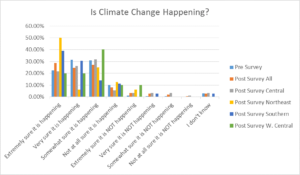
In both the pre and post surveys, the majority of student respondents indicated that climate change is happening at some degree. There does not appear to be a large change in student opinions between the pre and post surveys. When broken down by region, student opinions on climate change vary significantly, which suggests that students receive varying education or are influenced differently depending on where they live.
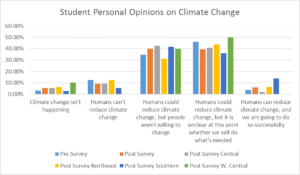 When examining students’ personal opinions on climate change in the post survey, 55% of students either do not believe in climate change or do not believe anything can be done about it compared to 45% that have a more optimistic view of climate change. In the pre survey, there was a 50/50 split between students with pessimistic and optimistic views of climate change. Unlike the previous question that also broke it out by region, there does not appear to be a large difference in student opinions by region in this question.
When examining students’ personal opinions on climate change in the post survey, 55% of students either do not believe in climate change or do not believe anything can be done about it compared to 45% that have a more optimistic view of climate change. In the pre survey, there was a 50/50 split between students with pessimistic and optimistic views of climate change. Unlike the previous question that also broke it out by region, there does not appear to be a large difference in student opinions by region in this question.
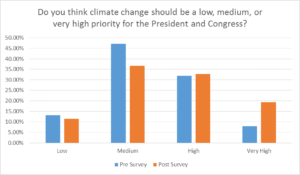 In both the pre and post surveys, the majority of students thought that climate change should be a higher priority for the President and Congress. While there was not a large difference between students in the low and high camps, there was a larger difference in the medium and very high camps between pre and post surveys.
In both the pre and post surveys, the majority of students thought that climate change should be a higher priority for the President and Congress. While there was not a large difference between students in the low and high camps, there was a larger difference in the medium and very high camps between pre and post surveys.
Student Climate Literacy
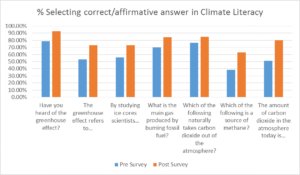
While student perceptions of climate change did not appear to shift dramatically, students did show an increase in climate literacy. In the post survey, more students answered correctly when asked questions on the science of climate change, which indicates an increase in knowledge.
Student Behavior Change
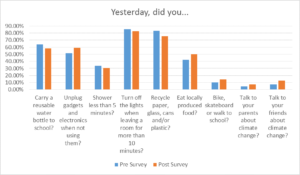
While there was a slight change in student behaviors between the pre and post surveys, they did not change dramatically. Most student behaviors showed a slight positive change, but there were a few that showed a slight negative change.
Overall, survey results indicate that the programming efforts conducted throughout the 2015-16 season increased student understanding of climate change science and boosted student confidence when talking about climate change. However, programming efforts do not appear to have largely changed student behaviors or opinions toward climate change and reducing their carbon footprint. More effort is needed on this front to further connect students to climate change and their personal and collective action conducted through YES! work. YES! staff will continue to build upon the work started in the 2015-16 season.
